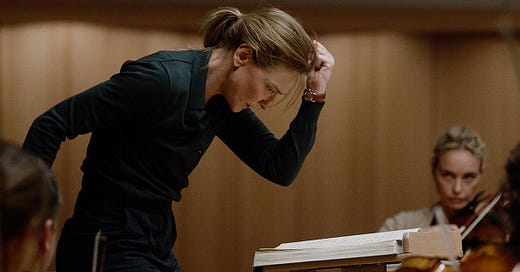The Tárring and feathering of classical music
Todd Field’s psychological drama Tár nearly takes a side in the classical music culture wars.
For fans of classical music, last year’s Oscar-fodder film Tár is packed with details that delight with their insiderish accuracy. But this film, as other reviewers have noted, is actually about power – how it is acquired, exploited, and how it slips away. As Deborah Ross, film critic at The Spectator wrote, to talk as if this is a film about classical music “would be like saying Citizen Kane is about tobogganing”. This review, however, is for the sledding aficionados who did go to see Tár at least in part for the music. And particularly, for those who have looked on in disappointment as musical directors the world over have impaled their profession for the cause of “social justice.”
In an opening act that’s an immaculate pastiche of life among the elite Upper West Side circle, we meet Lydia Tár, a world-famous conductor in director Todd Field’s imagining, perched at the pinnacle of the classical scene as head of the Berlin Philharmonic. As the film unfurls into a nearly Shakespearean psycho-thriller, what is astonishing is the titular character’s heterodoxy on matters of current debate, including the intrusion of “woke” ideas in classical music.
At one point, Tár is interviewed by Adam Gopnik of the New Yorker (playing himself) and states, without any descent into self-pity, that the feminization of titles (“maestra”) is silly and that her sex hasn’t been an issue in her rise to fame. Later, in a scene set in her Juilliard conducting seminar, she evicerates a “BIPOC” undergraduate after he says he can’t get with Bach ‘cause he’s an old, dead white guy. And when someone brings up Gustav Mahler’s sidelining of his wife’s musical talents, Tár responds bluntly that Alma Mahler had obviously accepted the conditions of their marriage willingly.
In the real world, the mainstays of classical music, including the leading music schools, opera houses and symphony orchestras, have for some time abandoned any such defense of their subject material. At the University of Oxford, there is a movement among students and faculty to “decolonize” its music curriculum, while the music critic at the New York Times has called for an end to blind auditions so that ensemble hires may be predicated on race and orchestras may “better reflect the diversity of the communities they serve.” (I can only presume the critic hasn’t bothered to take note of the “diversity” of the audiences that actually attend performances by the New York Philharmonic.)
The operas of Mozart, Puccini, Bizet and others are regularly slandered for their “orientalism” and alleged “exoticising” of non-Western cultures. Most culpable of all are those directors and producers who, bored and filled with contempt for the pieces they have been tasked with staging, seek to “interpret” the works and set them in ever more absurd and irrelevant settings. The fact is that attempts to make opera more "inclusive" by, say, setting Rigoletto in a Las Vegas casino or La Bohème in space do not attract new audiences, they merely alienate existing ones.
“The temptation is irresistible.” wrote the late Roger Scruton. ”Hardly a producer now, confronted with a masterpiece that might otherwise delight and console… an audience, can control the desire to desecrate. The more exalted the music, the more demeaning the production.”
Tár the character seems to understand that the task of the conductor is to convey, unapologetically, a message left by someone else. When prompted to describe her conducting philosophy, she says her job is to interpret the intentions of the composer and to “obviate yourself in front of the public.”
In a brilliant set piece, the central plot of Tár revolves around preparations for a live recording of Mahler’s Fifth Symphony. This is the music of moral certainty, and the tradition from which it comes is utterly un-self-conscious – in stark contrast to the whirlpool of paranoia, rumor, and impending psychosis that slowly envelopes the main character.
But the film won't come to a verdict on whether Tár or her detractors in the film are in the right. If the exposition act of the film appears critical of the current cultural moment, the latter half pulls back and equivocates on “cancel culture” as we watch her fall from grace amid allegations of sexual misconduct and abuse. As a meditation on power – Heavy lies the hand that holds the baton? – Tár is effective and devastating. But for a vindication of classical music on its own terms, viewers will have to search elsewhere.



